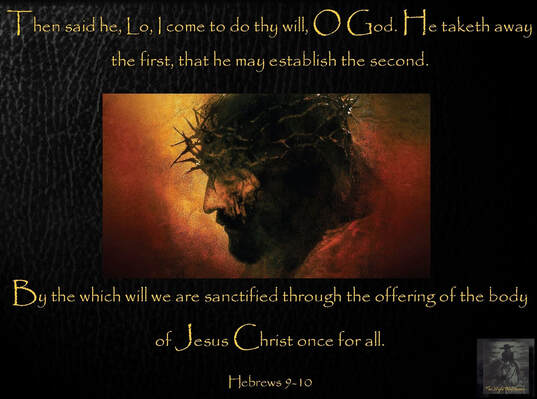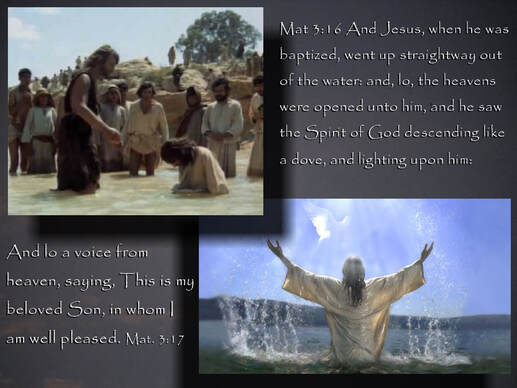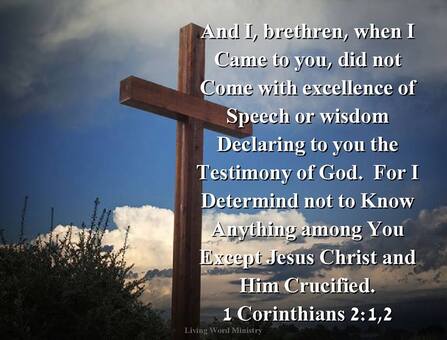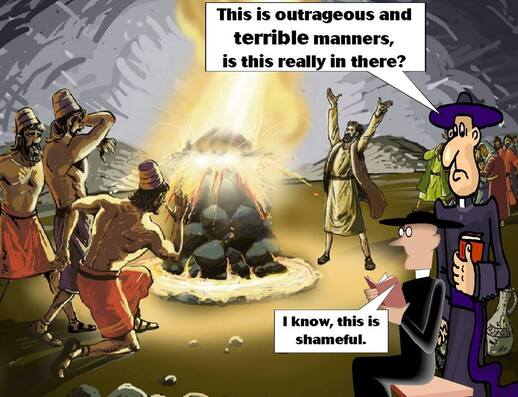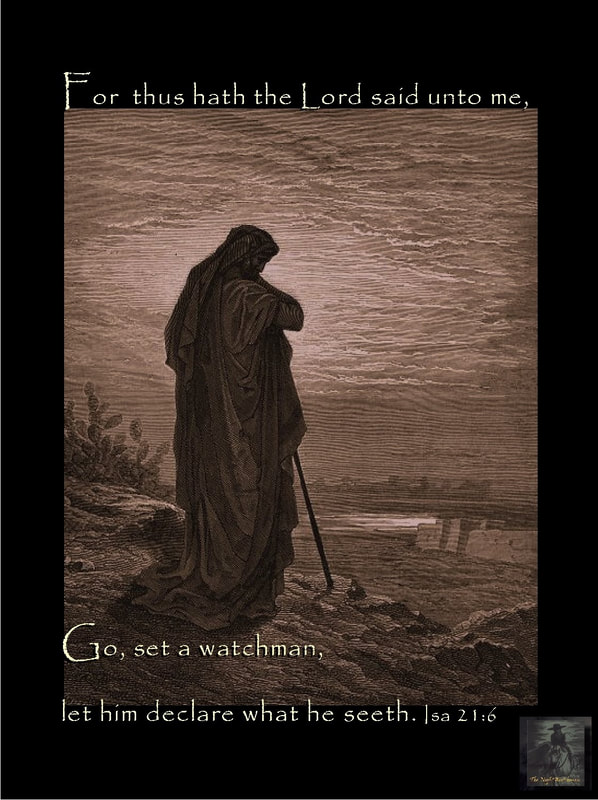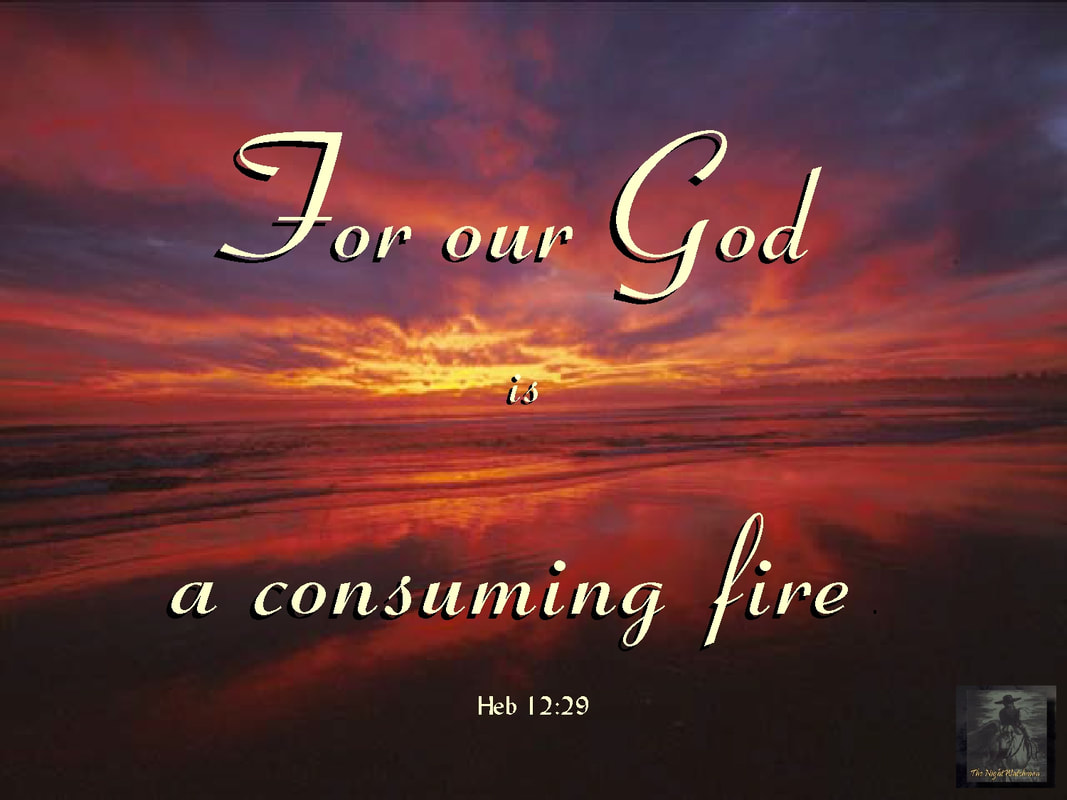|
For I acknowledge my transgressions: and my sin is ever before me. Against thee, thee only, have I sinned, and done this evil in thy sight: that thou mightest be justified when thou speakest, and be clear when thou judgest. Psa 51:3-4 Cast me not away from thy presence; and take not thy holy spirit from me. Restore unto me the joy of thy salvation; and uphold me with thy free spirit. Then will I teach transgressors thy ways; and sinners shall be converted unto thee. Psa 51:11-13 Treasury of David Charles Haddon Spurgeon Psa 51:3--“For I acknowledge my transgressions.” Here he sees the plurality and immense number of his sins, and makes open declaration of them. He seems to say, I make a full confession of them. Not that this is my plea in seeking forgiveness, but it is a clear evidence that I need mercy, and am utterly unable to look to any other quarter for help. My pleading guilty has barred me from any appeal against the sentence of justice: O Lord, I must cast myself on thy mercy, refuse me not, I pray thee. Thou hast made me willing to confess. O follow up this work of grace with a full and free remission! “And my sin is ever before me.” My sin as a whole is never out of my mind; it continually oppresses my spirit. I lay it before thee because it is ever before me: Lord, put it away both from thee and me. To an awakened conscience, pain on account of sin is not transient and occasional, but intense and permanent, and this is no sign of divine wrath, but rather a sure preface of abounding favor." Psa_51:4--“Against thee, thee only have I sinned.” The virus of sin lies in its opposition to God: the Psalmist's sense of sin towards others rather tended to increase the force of his feeling of sin against God. All his wrong-doing centred, culminated, and came to a climax, at the foot of the divine throne. To injure our fellow men is sin, mainly because in so doing we violate the law of God. The penitent's heart was so filled with a sense of the wrong done to the Lord himself, that all other confession was swallowed up in a broken-hearted acknowledgment of offence against him. “And done this evil in thy sight.” To commit treason in the very court of the king and before his eye is impudence indeed: David felt that his sin was committed in all its filthiness while Jehovah himself looked on. None but a child of God cares for the eye of God, but where there is grace in the soul it reflects a fearful guilt upon every evil act, when we remember that the God whom we offend was present when the trespass was committed. “That thou might be justified when thou speak, and be clear when thou judge.” He could not present any argument against divine justice, if it proceeded at once to condemn him and punish him for his crime. His own confession, and the judge's own witness of the whole transaction, placed the transgression beyond all question or debate; the iniquity was indisputably committed, and was unquestionably a foul wrong, and therefore the course of justice was clear and beyond all controversy." THE SACRIFICES GOD ACCEPTS Psa 51:12--“Cast me not away from thy presence.” Throw me not away as worthless; banish me not, like Cain, from thy face and favor. Permit me to sit among those who share thy love, though I only be suffered to keep the door. I deserve to be for ever denied admission to thy courts; but, O good Lord, permit me still the privilege which is dear as life itself to me. “Take not thy Holy Spirit from me.” Withdraw not his comforts, counsels, assistances, quickening, else I am indeed as a dead man. Do not leave me as thou didst Saul, when neither by Urim, nor by prophet, nor by dream, thou wouldst answer him. Thy Spirit is my wisdom, leave me not to my folly; he is my strength, O desert me not to my own weakness. Drive me not away from thee, neither do thou go away from me. Keep up the union between us, which is my only hope of salvation. It will be a great wonder if so pure a Spirit deigns to stay in so base a heart as mine; but then, Lord, it is all wonder together, therefore do this, for thy mercy's sake, I earnestly entreat thee."
Psa 51:13--“Restore unto me the joy of thy salvation.” Salvation he had known, and had known it as the Lord's own; he had also felt the joy which arises from being saved in the Lord, but he had lost it for awhile, and therefore he longed for its restoration. 'None but God can give back this joy; he can do it; we may ask it; he will do it for his own glory and our benefit. This joy comes not first, but follows pardon and purity: in such order it is safe, in any other it is vain presumption or idiotic delirium. “And uphold me with thy free Spirit.” Conscious of weakness, mindful of having so lately fallen, he seeks to be kept on his feet by power superior to his own. That royal Spirit, whose holiness is true dignity, is able to make us walk as kings and priests, in all the uprightness of holiness; and he will do so if we seek his gracious upholding. Such influences will not enslave but emancipate us; for holiness is liberty, and the Holy Spirit is a free Spirit. In the roughest and most treacherous ways we are safe with such a keeper; in the best paths we stumble if left to ourselves. The praying for joy and upholding go well together; it is all over with joy if the foot is not kept; and, on the other hand, joy is a very upholding thing, and greatly aids holiness; meanwhile, the free, noble, loyal Spirit is at the bottom of both." Psa 51:13--“Then will I teach transgressors thy ways.” It was his fixed resolve to be a teacher of others; and assuredly none instruct others so well as those who have been experimentally taught of God themselves. Reclaimed poachers make the best gamekeepers. Huntingdon's degree of S.S., or Sinner Saved, is more needful for a soul-winning evangelist than either M.A or D.D. The pardoned sinner's matter will be good, for he has been taught in the school of experience, and his manner will be telling, for he will speak sympathetically, as one who has felt what he declares. The audience the Psalmist would choose is memorable - he would instruct transgressors like himself; others might despise them, but, “a fellow feeling makes us wondrous kind.” If unworthy to edify saints, he would creep in along with the sinners, and humbly tell them of divine love. The mercy of God to one is an illustration of his usual procedure, so that our own case helps us to understand his “ways,” or his general modes of action: perhaps, too, David under that term refers to the preceptive part of the word of God, which, having broken, and having suffered thereby, he felt that he could vindicate and urge upon the reverence of other offenders. “And sinners shall be converted unto thee.” My fall shall be the restoration of others. Thou wilt bless my pathetic testimony to the recovery of many who, like myself, have turned aside unto crooked ways. Doubtless this Psalm and the whole story of David, have produced for many ages the most salutary results in the conversion of transgressors, and so evil has been overruled for good." Luk 15:18 I will arise and go to my father, and will say unto him, Father, I have sinned against heaven, and before thee, Luk 15:19 And am no more worthy to be called thy son: make me as one of thy hired servants. Luk 15:20 And he arose, and came to his father. But when he was yet a great way off, his father saw him, and had compassion, and ran, and fell on his neck, and kissed him. Luk 15:21 And the son said unto him, Father, I have sinned against heaven, and in thy sight, and am no more worthy to be called thy son. Luk 15:22 But the father said to his servants, Bring forth the best robe, and put it on him; and put a ring on his hand, and shoes on his feet: Luk 15:23 And bring hither the fatted calf, and kill it; and let us eat, and be merry: Luk 15:24 For this my son was dead, and is alive again; he was lost, and is found. And they began to be merry. Wherefore when he cometh into the world, he saith, Sacrifice and offering thou wouldest not, but a body hast thou prepared me: In burnt offerings and sacrifices for sin thou hast had no pleasure. Then said I, Lo, I come (in the volume of the book it is written of me,) to do thy will, O God. Above when he said, Sacrifice and offering and burnt offerings and offering for sin thou wouldest not, neither hadst pleasure therein; which are offered by the law; Then said he, Lo, I come to do thy will, O God. He taketh away the first, that he may establish the second. By the which will we are sanctified through the offering of the body of Jesus Christ once for all. Heb 10: 5-10 Lo, I Come None but the Son of God could offer unto the Father a sacrifice to please Him, and to reconcile us unto Him in a perfect manner. The burnt-offerings and sin-offerings were ordained merely as shadows and temporary types of that one offering, the self-devotedness of the Son of God to accomplish all the will of God, the counsel of salvation. It is the Divine and eternal offering of Himself unto the Father in which the incarnation and death of the Lord Jesus are rooted; it is the voluntary character of His advent and passion, and it is the Divine dignity of the Mediator, which render His work unique, to which nothing can be compared, and a repetition of which is impossible. Rise from the river to its source, from the rays of light and love to the eternal origin and fount. See in the life, the obedience, the agony of Jesus, the expression of that free surrender of Himself, and espousal of our cause, which was accomplished in eternity, in His own all-glorious and perfect divinity. Beware lest you see in Him only the faith and obedience, the sufferings and death of the Son of Man; see His eternal divinity shining through and sustaining all His humanity. This truth is revealed to us, not merely to establish our hearts in peace, and to fill us with adoring gratitude and joy, but here, marvelous to say, is held out to us a model which we are to imitate, a principle of life which we are to adopt. So wondrously are high mysteries and deep doctrines intertwined with daily duties, and the transformation of our character, that the Apostle Paul, when exhorting the Philippians to avoid strife and vain-glory, and have brotherly love and helpfulness, ascends from our lowly earthly path into this highest region of the eternal covenant. As we owe all to Him, let us be not merely debtors, but followers of Him who came, not to do His own will, and to be ministered unto, who came to love and to serve, to give and to bless, to suffer and to die. [A. Saphir, Lectures on Hebrews, vol. ii., p. 167] Perfect Sanctification THE ETERNAL WILL—“By the which wilt we are sanctified.” 1. This will must, first of all, be viewed as the will ordained of old by the Father—the eternal decree of the infinite Jehovah, that a people whom He chose should be sanctified and set apart unto Himself. 2. This wilt by which we are sanctified was performed of the ever blessed Son. 3. This work is applied to us by the Holy Spirit. THE EFFECTUAL SACRIFICE by which the will of God with regard to the sanctity of His people has been carried out. “By the which will we are sanctified through the offering of the body of Jesus Christ.” 1. This implies, first, His incarnation, which of course includes His eternal Deity. Jesus Christ, very God of very God, did certainly stoop to become such as we are, and was made in the likeness of sinful flesh. 2. All this is implied in the text, because it speaks of the offering of the body of Christ. But why does it specially speak of the body? I think to show us the reality of that offering; His soul suffered, but to make it palpable to you, to record it as a sure historical fact, He mentions that there was an offering of the body of Christ. 3. I take it, however, that the word means the whole of Christ—that there was an offering made of all Christ, the body of Him, or that of which He was constituted. THE EVERLASTING RESULT-THIS MAN IS NOW SAT DOWN AT THE RIGHT HAND OF GOD-No further sacrifices are to be made: Heb 10:12 But this man, after he had offered one sacrifice for sins for ever, sat down on the right hand of God; Heb 10:13 From henceforth expecting till his enemies be made his footstool. 1. The everlasting result of this effectual carrying out of the will of God is that now God regards His people’s sin as expiated, and their persons as sanctified. Offered, and its efficacy abides for ever. 2. They are reconciled. 3. They are purified. (C. H. Spurgeon.) When He Cometh Into the World Since the Levitical sacrifices could not cleanse from sin, Christ, the Redeemer from sin, said when he entered upon his mission, Sacrifice and offering thou wouldest not. Quoted from Psa_40:6-8. Psa 40:6 Sacrifice and offering thou didst not desire; mine ears hast thou opened: burnt offering and sin offering hast thou not required. Psa 40:7 Then said I, Lo, I come: in the volume of the book it is written of me, Psa 40:8 I delight to do thy will, O my God: yea, thy law is within my heart. Since the sacrifices and offerings of the Jewish altar did not meet God's will. A body hast thou prepared me for an offering. This is Christ's offering. In burnt offerings. Burnt offerings were wholly consumed. See Lev_1:17. Lev 1:17 And he shall cleave it with the wings thereof, but shall not divide it asunder: and the priest shall burn it upon the altar, upon the wood that is upon the fire: it is a burnt sacrifice, an offering made by fire, of a sweet savour unto the LORD. Sacrifices for sin. See Lev. 4:1 to 5:13. They were so called because of their special reference to sin. In neither had God pleasure; that is, they did not fully meet his will. Then said I, Lo, I come. The Psalmist represents Christ, who comes simply to do the will of God, completely surrendered to his will. In the volume of the book. In the roll of the law it is written of me; that is, there I am predicted. Then said he. He said, first, "The Levitical sacrifices do not please God;" then he said, second; Lo, I come to do thy will. This is pleasing to God. Hence he taketh away the first, the old covenant with its sacrifices, and establishes the second, the new covenant inaugurated by complete submission to the will of God. By which will we are sanctified. By this complete submission our sins are removed from us and we are made holy. The meaning of "sanctified" here is remission of sin. Through the offering of the body of Jesus Christ. In Christ's surrender his body was offered on the cross, once for all for sin, and by that offering our sins are remitted. [B.W. Johnson] Comments from Adam Clarke: "He taketh away the first - The offerings, sacrifices, burnt-offerings, and sacrifices for sin, which were prescribed by the law. That he may establish the second - The offering of the body of Jesus once for all. It will make little odds in the meaning if we say, he taketh away the first covenant, that he may establish the second covenant; he takes away the first dispensation, that he may establish the second; he takes away the law, that he may establish the Gospel. In all these cases the sense is nearly the same: I prefer the first." CHRIST’S ONE SACRIFICE IS ALTOGETHER SUFFICIENT That is, by the sacrifice of Christ, which was willingly offered up by himself, and was according to the will of God; it was his will of purpose that Christ should be crucified and slain; and it was his will of command, that he should lay down his life for his people; and it was grateful and well pleasing to him, that his soul should be made an offering for sin; and that for this reason, because hereby the people of God are sanctified, their sins are perfectly expiated, the full pardon of them is procured, their persons are completely justified from sin, and their consciences purged from it: even through the offering of the body of Jesus Christ once for all; this is said, not to the exclusion of his soul; it designs his whole human nature, and that as in union with his divine person; and is particularly mentioned, in allusion to the legal sacrifices, the bodies of slain beasts, which were types of him, and with a reference to his Father's preparation of a body for him, for this purpose, Heb_10:5. Moreover, his obedience to his Father's will was chiefly seen in his body; this was offered upon the cross; and his blood, which atones for sin, and cleanses from it, was shed out of it: and this oblation was "once for all"; which gives it the preference to Levitical sacrifices; destroys the Socinian notion of Christ's continual offering himself in heaven; and confutes the error of the Popish mass, or of the offering of Christ's body in it. [John Gill] A Living Sacrifice Trace the argument. Those old Jewish sacrifices had no value in themselves. The prophets—especially Isaiah and Hosea—made that quite plain. Their value lay solely in their being a means by which the will of a man was offered to God. When this is taught so as to be fully apprehended, formal sacrifice may cease. It has done its work. The final lesson is the Divine acceptance of the offering of Himself which came to Jesus. Christ’s whole life was His sacrifice. The sacrifice that God wants is the man, not something a man gives. The offering of a man himself is the offering of a life—that alone is the man. This makes Christ’s death the final act, the seal, the perfecting of His sacrifice; because that death completes, rounds off, the life. No life is complete until death seals it. Christ’s death is the great act of surrendered will under the most severe testing-conditions. Dead—human life ended—there is a whole man offered unto God.
That sacrifice—the spiritual sacrifice of the surrendered will—was offered through the body.—Things can have no influence on us that do not come within our range, do not lie in our plane. Moral forces are compelled to use material agencies because we are in material limitations. The surrender of the will of an angel is nothing to us. The surrender of the will of a human being like ourselves is everything to us. Christ became man that He might be able to offer a human sacrifice, because that is precisely what we ought to offer. An angel could not offer our sacrifice: the Son of God, as only Son of God, could not. Christ became representative man that He might offer His sacrifice of Himself in our name, as standing for and pledging us. That offering satisfies once for all.—Picture-teaching needs repetition, “line upon line, precept upon precept.” The teaching of principles is done once for all. Christ’s sacrifice need not be repeated, because it effected its end—1. With God. Did this representative offering of the surrendered will meet God’s requirement from us His creatures? The answer is the Resurrection. 2. With men. Was that devotion of Christ to our interests, which led Him to suffer so much in order to secure an acceptable sacrifice for us, such a devotion as could be really persuasive on us? The answer is our experience. The sacrifice of Christ must not be repeated, even in symbol. To repeat the sacrifice is to remove Christ from His present work of applying the gains of His sacrifice. What then have we to keep in mind? Is it only the medium, the bodily agency of the great sacrifice? Every incident of the Passion is intensely interesting to us. But there is a mystery within it. There is a real spiritual sacrifice. It is a man’s surrendered will. We cannot offer a material sacrifice with Christ. We can offer a spiritual sacrifice with Him. That we will offer it He pledges in our name. But our sacrifice, like His, must be made through our bodies. Our lives, lived unto God, are our sacrifice. [Preacher's Homiletical] So as Christ has purchased us by His own blood, now we look to Him as our pattern of service, and follow in His steps. Rom 12:1 I beseech you therefore, brethren, by the mercies of God, that ye present your bodies a living sacrifice, holy, acceptable unto God, which is your reasonable service. Rom 12:2 And be not conformed to this world: but be ye transformed by the renewing of your mind, that ye may prove what is that good, and acceptable, and perfect, will of God. "For if by one man's offence death reigned by one; much more they which receive abundance of grace, and of the gift of righteousness, shall reign in life by One, Jesus Christ." Rom 5:17 LIFE ABUNDANT: GRACE ABOUNDING NOTICE THAT word Receive. We first receive forgiveness, or reconciliation, then abundance of grace. Rom 5:11 And not only so, but we also joy in God through our Lord Jesus Christ, by whom we have now received the atonement. Rom 5:12 Wherefore, as by one man sin entered into the world, and death by sin; and so death passed upon all men, for that all have sinned: Rom 5:13 (For until the law sin was in the world: but sin is not imputed when there is no law. Rom 5:14 Nevertheless death reigned from Adam to Moses, even over them that had not sinned after the similitude of Adam's transgression, who is the figure of him that was to come. Rom 5:15 But not as the offence, so also is the free gift. For if through the offence of one many be dead, much more the grace of God, and the gift by grace, which is by one man, Jesus Christ, hath abounded unto many. Rom 5:16 And not as it was by one that sinned, so is the gift: for the judgment was by one to condemnation, but the free gift is of many offences unto justification. Rom 5:17 For if by one man's offence death reigned by one; much more they which receive abundance of grace and of the gift of righteousness shall reign in life by one, Jesus Christ. We cannot merit or earn either one or the other; all that we have to do is to take what God offers, by an act of the will which accepts and appropriates. If men are lost, it is because they refuse to receive the grace and love of God, secured to us, in spite of our failure and sin, through the second Adam. We must believe that we have received, even when we are not conscious of any new experience. Joh 1:12 But as many as received him, to them gave he power to become the sons of God, even to them that believe on his name: It is a blessed thing, when our emotional life is at a low ebb, and we feel out of sorts, to receive, to inbreathe, to drink in the "abundance of grace," and to know that He is working in us in power. There is no limit to the abundance of God's supply—it abounds! The Apostle keeps using that word, which really means "running over ". Rom 5:15 But not as the offence, so also is the free gift. For if through the offence of one many be dead, much more the grace of God, and the gift by grace, which is by one man, Jesus Christ, hath abounded unto many. Rom 5:16 And not as it was by one that sinned, so is the gift: for the judgment was by one to condemnation, but the free gift is of many offences unto justification. Rom 5:17 For if by one man's offence death reigned by one; much more they which receive abundance of grace and of the gift of righteousness shall reign in life by one, Jesus Christ.) And the result of receiving more and more out of God's fullness, is that we reign, not in the future life, but in this. Ours becomes a royal, a triumphant life. This glorious life in which we are daily victorious over sin, daily using and scattering the unsearchable riches of Christ, daily helping others up to the throne-life, is within the reach of every reader of these words. God wants you to enter upon it; He has made every provision for it, and is at this moment urging you to enter upon it. The only thing for you to do is to receive the abundance of His grace and of the gift of righteousness. Open your heart and life and He will fill it; dare to believe that He has filled it, even though you don't feel it; and go forth to live a royal life, distributing the largeness of His royal bounty. But we must pour out as God pours in. Only so will He be able to trust us with His fullness. Our love to others, our willingness to help them, our forgivingness and patience must go to the point of self-exhaustion, if we would know the abundant life and the grace that flows over. (Our Daily Walk) DEATH THROUGH ADAM, LIFE THROUGH CHRIST But not as the offence, so also is the free gift. While Adam is a type of Christ, there is a great difference. One kills, the other makes alive. "If through the sins of the one the many (the world of mankind) died," through the gracious gift of God, through one man, Jesus Christ, life has been given to the many. All will be raised at the last day.
And not as through one that sinned, so is the gift. A second difference between Adam and Christ is pointed out. One offence of Adam caused condemnation to be sent on Adam and all his race. All have been under death. But the free gift, through Jesus Christ, not only pardons the connection of our race with Adam's sin, but provides a way for the pardon of many offences, all our offences, so as to secure justification. One sin of Adam destroyed all, but the atonement of Jesus Christ provides conditions for forgiveness of all sins. For if by one man's offence. The superabounding grace of Christ is still further shown. As a result of Adam's one offence, death reigned over men. So, on the other hand, those who accept Christ's grace, and enjoy his righteousness, shall, through him, reign in life. The life spoken of is the resurrection from the grave, and the privilege, not the guarantee, of eternal life that is offered through the gospel. Therefore as by the offence of one. By Adam's offence, which brought the sentence of death on all our race. Even so by the righteousness of one. Jesus Christ. The free gift came upon all to justification of life. This passage shows that Christ's death brought for all men all that had been lost by Adam's sin. Adam's sin brought: (1) Natural death. (2) Spiritual death to all who continued in sin. Christ's death brings: (1) Life for all. All shall be resurrected from the dead. (2) Therefore it brings the full pardon of the sin of our race in Adam. (3) Therefore all infants and irresponsible persons are now sinless. (4) It brings eternal life to all who are freed from Adam's sin, and have no personal sins of their own; and (5) It brings the opportunity of forgiveness of personal sins through the gospel, and hence, of securing eternal life. For as by one man's disobedience. By Adam's disobedience, all disobeyed and were counted sinners. So by the obedience of one, all are counted obedient, and hence, righteous. That is, all inherited penalty for Adam's sin is blotted out for the whole race. All who have not personal sins are held to be justified. Hence all infants are sinless. The basis of infant baptism is removed. Baptism is for those who have personally sinned. (B.W. Johnson) Baptism is for the redeemed, for those who've repented of sin, and been washed in the blood of the Lamb, Jesus Christ-Peter gives the proclamation to all who will come to Christ, and receive His salvation and be baptized: Act 2:36 Therefore let all the house of Israel know assuredly, that God hath made that same Jesus, whom ye have crucified, both Lord and Christ. Act 2:37 Now when they heard this, they were pricked in their heart, and said unto Peter and to the rest of the apostles, Men and brethren, what shall we do? Act 2:38 Then Peter said unto them, Repent, and be baptized every one of you in the name of Jesus Christ for the remission of sins, and ye shall receive the gift of the Holy Ghost. Act 2:39 For the promise is unto you, and to your children, and to all that are afar off, even as many as the Lord our God shall call. Jesus Christ Himself is our pattern-and has led us into all righteousness. But beware of men: for they will deliver you up to the councils, and they will scourge you in their synagogues; And ye shall be brought before governors and kings for my sake, for a testimony against them and the Gentiles. But when they deliver you up, take no thought how or what ye shall speak: for it shall be given you in that same hour what ye shall speak. For it is not ye that speak, but the Spirit of your Father which speaketh in you. And the brother shall deliver up the brother to death, and the father the child: and the children shall rise up against their parents, and cause them to be put to death. And ye shall be hated of all men for my name's sake: but he that endureth to the end shall be saved. But when they persecute you in this city, flee ye into another: for verily I say unto you, Ye shall not have gone over the cities of Israel, till the Son of man be come. The disciple is not above his master, nor the servant above his lord. It is enough for the disciple that he be as his master, and the servant as his lord. If they have called the master of the house Beelzebub, how much more shall they call them of his household? Mat 10:17-25 STEADFAST UNDER PERSECUTION Likeness to the teacher in wisdom is the disciple’s perfection. "If the blind lead the blind, both shall fall into the ditch." "The disciple is not greater than his master." "It is enough for the disciple that he be as his master." If that be a true principle, that the best that can happen to the scholar is to tread in his teacher’s footsteps, to see with his eyes, to absorb his wisdom, to learn his truth, we may apply it in two opposite directions. First, it teaches us the limitations, and the misery, and the folly of taking men for our masters; and then, on the other hand, it teaches us the large hope, the blessing, freedom, and joy of having Christ for our Master. Look first at the principle as bearing upon the relation of disciple and human teacher. All such teachers have their limitations. Each man has his little circle of favorite ideas, that he is perpetually reiterating. In fact it seems as if one truth was about as much as one teacher could manage, and as if whensoever God had any great truth to give to the world He had to take one man and make him its sole apostle; so that teachers become mere fragments, and to listen to them is to dwarf and narrow oneself. It is safe to follow Christ absolutely, and Him alone. In following Christ as our absolute Teacher there is no sacrifice of independence or freedom of mind, but listening to Him is the very way to secure that in its highest degree. Turn to the second application of this principle. Likeness to the Master in life is the law of a disciple’s conduct. There is no discipleship worth naming which does not at least attempt that likeness. They whose earthly life is following Christ, with faltering steps and afar off, shall have for their heavenly blessedness, they shall "follow the Lamb whithersoever He goeth." Likeness to the Master in relation to the world is the fate that the disciple must put up with. If we are like Jesus Christ in conduct, and if we have received His word as the truth upon which we repose, depend upon it, in our measure and in varying fashions, we shall have to bear the same kind of treatment from the world. If you do not know what it is to find yourselves out of harmony with the world, I am afraid it is because you have less of the Master’s spirit than you have of the world’s. The world loves its own. If you are not of the world, the world will hate you. If it does not, it must be because, in spite of your name, you belong to it. (A. Maclaren, Christian Commonwealth, June 18th, 1885) The Disciple is Not Above His Master That is, you must expect the same treatment which I have received. They have called me, your Master and Teacher, Beelzebub, the prince of the devils (see Mat_12:23-24; Luk_11:14-15; Joh_8:48), and you must expect that they will call all of the family by the same name.
Mat 12:23 And all the people were amazed, and said, Is not this the son of David? Mat 12:24 But when the Pharisees heard it, they said, This fellow doth not cast out devils, but by Beelzebub the prince of the devils. Luk 11:14 And he was casting out a devil, and it was dumb. And it came to pass, when the devil was gone out, the dumb spake; and the people wondered. Luk 11:15 But some of them said, He casteth out devils through Beelzebub the chief of the devils. Joh 8:48 Then answered the Jews, and said unto him, Say we not well that thou art a Samaritan, and hast a devil? “Beelzebub” was a god of the Ekronites. See 2Ki_1:2. The word literally means “the god of flies,” so called because this idol was supposed to protect them from the numerous swarms of flies with which that country abounded. The correct reading here, as in Luk_11:15, Luk_11:18-19; Mar_3:22, is supposed to be, not “Beelzebub,” but “Beelzebul” (Griesbach, Hahn, Robinson, Lexicon) an Aramean form of the word meaning the “god of dung” or “filth.” The name, thus altered by the Jews by changing a single letter, was given to Satan to express supreme contempt and aversion. The Jews seem to have first given to Satan the name of a pagan god, and then, to express their sense of the character of Satan, to have changed that name by altering a single letter so as to express their aversion in the most emphatic manner. By giving the name to Christ, they poured upon him the greatest possible abuse and contempt. (Albert Barnes) My thoughts on these verses: I've listened to many preachers, and teachers of the Bible since my salvation in 1978, and have heard almost none of them preach anything on these verses, especially the TV preachers, with mega churches. It's not hard to understand why. They do not fit the narrative that these false teachers want to portray to the world. They preach a cotton candy message that's another gospel, not the gospel of the cross, and what it really means to preach repentance and discipline, walking in the commandments of God, and seeking to put away the flesh. They may skim over a few verses to make it seem they are legitimate, but they are really seeking to be applauded, popular, and enticing a following, to gain the donations to keep financing them. If they preached these verses, and others like them very often, they'd quickly lose a majority of the people, and they know it. God uses many ways to test someone, and what their motives really are in following Him. He never forces anybody to serve Him, or love Him, but he doesn't tell you any lies either. These verses, and many other's like them, make it very clear what a follower of Christ will have to deal with, and over the years, I've had enough experiences to know His warnings were clear and completely true. Every time I've dealt with the same insults, and mistreatment, it's been a test for me to see whether I'd walk away from Jesus, to follow the crowd, or keep walking on with the Lord. Or, will I give in to the temptation to twist the scriptures, and give a smooth teaching that tickles the ears, and makes people think there's no cost in following Christ. There's no turning back for me, I'm made my choice. There's nothing in this world worth losing His presence, and the assurance of heaven, when this life is done. What this world thinks of me is unimportant, what He thinks of me, is all that matters. I'd rather live under the shadow of His wings, and His approval, than the crowds of the world, or any king of this earth. Lorna Couillard Mat 10:32 Whosoever therefore shall confess me before men, him will I confess also before my Father which is in heaven. Mat 10:33 But whosoever shall deny me before men, him will I also deny before my Father which is in heaven. So Ahab sent unto all the children of Israel, and gathered the prophets together unto mount Carmel. And Elijah came unto all the people, and said, How long halt ye between two opinions? if the LORD be God, follow him: but if Baal, then follow him. And the people answered him not a word. 1Kings 18:20-21 "How the pulse quickens as we read the story! In his splendid isolation stands Elijah against king, court, and nation. For three years he has been a hunted fugitive; for three years Jezebel has enjoyed her wicked triumph; but this one man is unsubdued and unsubduable. At last he comes forth from his desert, and he comes like a thunderbolt. He bars the way of the king’s chariot with a gesture, and silences him with one stern accusation: “Thou and thy father’s house have made Israel to sin!” Never was the fearlessness of right so splendidly illustrated, or the impotence of evil so conclusively exposed. The hunter is dumb before his prey; the tyrant quails before his victim. There is a royalty in righteousness before which all other royalty is but tinsel; there is a supremacy in goodness which strikes the wicked dumb. Are you armed with that supremacy? Dare you stand fearless in the right though the heavens fall? Only then is man invulnerable. No one can defeat a man who is in the right. He may be a wild man of the desert and stand in tattered garb, but the chariots of wrong stop at his signal, and kings fear his face. When Elijah says, “Gather to me all Israel unto Mount Carmel,” Ahab knows he must obey. So to Carmel Israel is gathered; there the broken altars are rebuilt, and there the question of the text is put to the vast multitude, who at last, when the fire of God descends, cry in fearful acquiescence not less than profound conviction, “The Lord, he is the God; the Lord, he is the God.” (excerpt from Great Texts) Jehovah or Baal The God of this World Takes Various Forms Elijah called the people to decide between two Gods—Jehovah and Baal. This decision has to be made in every age. Now Baal, the male, and Ashtaroth, the female, represented the fertilizing and productive principle in nature, and their worship was that of power. To the more cultivated and refined, it was simply a species of pantheism; to the multitude, it was what one has called “the worship of deified abundance, under a splendid and sensuous ceremonial”; or, as Maurice has put it, “The worship of Baal was the worship of power as distinguished from righteousness.” But we are less concerned with what Baal stood for to the Israelites than with what “the God of this world” means to ourselves. (1) Here is one form. We do not cast him into the form of a graven, or a molten, image; we may not set him up in the “plains of Dura, in the province of Babylon,” but we set him up in London, at the Stock Exchange. We have little images of him in our own houses, and we worship him with the “sound of the cornet, flute, harp, sackbut, psaltery, and dulcimer, and all kinds of music,” and we call him Money. We are great at the worship of Mammon. People never seem tired of burning incense to wealth. To-day, a man may be so despicable a creature that we would not demean ourselves by touching him with the extreme tip of our little finger. He suddenly becomes heir to ten thousand a year, and to-morrow we are only too glad to get into our carriage and call upon him. What has made the difference? He has become a successful “worshipper of the golden image,” and we, as other high priests of this idolatry, are bound to fraternize with this excellent person. Who is he? “The God of this World.” The Baal of our day. (2) Here is another “God of this world”; we set him up on a lofty tower of ivory, or we put him into one of our superb equipages, and roll him through the street, with a four-in-hand, and we call him Rank! And everybody bows down and worships this God, as he passes along. Look at him there, as he goes along in all his splendor, and the votaries of this world bow down with profound obeisance, and do him honor. (3) Here is another “God of this world”! We deck him with all kinds of silks, satins, and load him with jewelry, and we call him Fashion. We put him in our drawing-rooms; our roués are skillful in his worship, and women are specially devoted to him. If he makes us ridiculous it is no matter. Any kind of eccentricity is pardoned, even though our own tastes condemn us for the form our worship assumes, though our own reason may rise up against it, and we may sometimes say, as we look into our glass, “What a ridiculous, empty-headed, wax doll I have made of myself.” Yet in the very same moment we none the less eagerly offer our incense to the worship of the God that we have made. (4) Here is another God. We beat drums, and we blow trumpets; we deck him in scarlet regimentals; and we write the name Ambition upon his brow, and fall down and worship him. What deity so great as this God? We honor him supremely; we are never tired of speaking about him; poets write of him; and philosophers go out of their way to make themselves ridiculous about him; even ministers of the gospel of peace can become eloquent in sounding forth the praises of what they are pleased to call “glory.” (5) Or it may be we call him Pleasure. He puts on the fool’s mask, and wherever he goes eager crowds of admirers follow him. “There goes the God of this world.” “Have you heard So-and-so? Go and hear him: why, you would die of laughing!” As though it were worthy of the dignity of humanity to lay itself out for levity; as though we were not frivolous enough by nature, but must needs pay our fellow-travelers on the broad road to make us more frivolous than we were before. (Note: Canon Hay Aitken) Elijah and the prophets of Baal And Elijah said unto them, Take the prophets of Baal; let not one of them escape. And they took them: and Elijah brought them down to the brook Kishon, and slew them there. 1Kings 18:40 To end this devotion I'm going to add my thoughts, and some comments, and how I see it relates to today. I have no doubt, what I say will not be popular.
The world today is full of a level of lying, cursing, and wickedness, that can compare to the days of Elijah. Not only is it considered normal, but, if you speak up against this to any degree you will be met with a tidal wave of vile responses. If you speak up and use the word of God in the manner it's intended, and not whitewashed, in many churches, you will find yourself given the left foot of fellowship and told not to come back. I've had it done to me. You'll be accused of being unloving, bitter, hard to get along with, and a lot more. The name of the game in society is go along, to get along. Be sweet, learn how to tell people how wonderful they are-and it doesn't matter how foulmouthed you are, you can use the most vile curses and still be honored and praised, as long as you never touch the subjects that would expose their crooked, lying conduct. Don't try to speak truth to people who have no desire to know truth-they are very happy being gaslighted, lied to, and scammed, as long as you remain one of them, and fit into their crowd. If you won't follow them or the idolatry their living in, you will very soon find yourself the outsider. This is what Elijah was, and he decided companionship with God, was worth more than the phony sham the people were living for, and separated himself from them, and the prophets of Baal and exposed them. For this, he found himself an enemy of Jezebel and Ahab. At the showdown at Mt. Carmel, he called on God to answer him and consume the sacrifice, to show the people that He was the real God, and expose their idolatry. When God sent the fire down and consumed it-the people fell on their faces. After he killed the over 400 false prophets, Jezebel threatened to have him killed and chased him down to do it. Question: If any preacher/evangelist/prophet-or even just an on fire believer came today, and spoke and acted like Elijah, what would happen to them? They'd be accused of being mentally ill, unstable, irrational, intolerant, violent. They'd be accused of having no love. They'd be tracked, psychoanalyzed, taken into custody, and put behind bars somewhere. This is the difference between what God thinks of those who won't compromise and serve the devil-and what the world thinks of them. There's a lot of innocent people in cages, and prisons, that are in this category today. The increase of hatred of uncompromising Christians today, need to know what the level of hatred is against them, if they don't know it already. What's being done in this country to kill the morals, and faith in God by the government, and the crooked people working in it, is a serious sign of what we are coming up against. Question 2: What do you think this country would be like today, if the Constitution, Bill of Rights, and the original laws of this land were enforced the same way they were intended by the Founding Father's of this country, when they put them into place? If the boundary laws of this country were enforced as they were written and put into place-would we be in the crisis we are in now? If the people who are supposed to be the servants of this country were bound by the laws that are in place, and they could not remain in office if they are proved to be corrupt, and inept, would we be on the brink of collapse now? We are a nation saturated with sin, and idolatry, and we are reaping what we have sown. I've been walking with the Lord for over 45 yrs., and seen the rise of hatred for Christians, and the collapse of society-everything is upside down. The trials, and confrontations I've had over the years has caused me to cleave to the Lord Jesus Christ as my only source of companionship, comfort, and a refuge from the deceptions, lies, and attacks from the devil that comes from every direction. If I want to know how to discern truth from error on any subject-I pick up my Bible and find the subject I'm dealing with, and start reading, and praying about it. God has never failed to give me the needed answer. He's proved to me just as he did Elijah, that He is the Only true and Living God. I'll end with this quote by Dr. Cadman: it defines this prophet well- "Elijah was intolerant—narrow, as some would call it. Some things must be narrow in order to do their work. You want a narrow edge on your razor. About the broadest thing in the world is the Desert of Sahara. No Christian should attempt a compromise between wrong and right." Lorna Couillard Mat 7:13 Enter ye in at the strait gate: for wide is the gate, and broad is the way, that leadeth to destruction, and many there be which go in thereat: Mat 7:14 Because strait is the gate, and narrow is the way, which leadeth unto life, and few there be that find it. |
Welcome
In this page there will be devotions/poems music and inspirational material 
The Lord Will Pour Out His Spirit
And it shall come to pass afterward, that I will pour out my spirit upon all flesh; and your sons and your daughters shall prophesy, your old men shall dream dreams, your young men shall see visions:
And also upon the servants and upon the handmaids in those days will I pour out my spirit. And I will shew wonders in the heavens and in the earth, blood, and fire, and pillars of smoke. The sun shall be turned into darkness, and the moon into blood, before the great and the terrible day of the LORD come. And it shall come to pass, that whosoever shall call on the name of the LORD shall be delivered: for in mount Zion and in Jerusalem shall be deliverance, as the LORD hath said, and in the remnant whom the LORD shall call. Joel 2:28-32 But this is that which was spoken by the
prophet Joel; And it shall come to pass in the last days, saith God, I will pour out of my Spirit upon all flesh: and your sons and your daughters shall prophesy, and your young men shall see visions, and your old men shall dream dreams: And on my servants and on my handmaidens I will pour out in those days of my Spirit; and they shall prophesy: Act 2:16-18 Resources
Madame Guyon - A Short and Easy Method of Prayer / Christian Audio Book (1 / 2) https://youtu.be/eihZWpAk7y4?si=PQ-_J3Y6i8u-N2Ac Union With God By Jeanne Guyon Chapter 1 Of 7 https://youtu.be/d5AfKS2dFLg?si=VtWAeEurkAddTDpL The Practice of the Presence of God - audiobook Brother LAWRENCE (1614 - 1691)- https://youtu.be/rRAs_BK1NR8?si=hGAL4C829aH7 DKMn Gander Story Poems
https://www.gander poems.org/ Archives
July 2024
|
Proudly powered by Weebly


